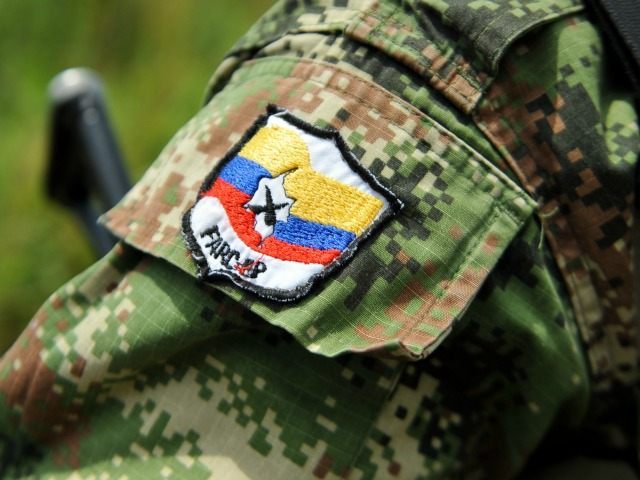Colombia’s Attorney General is investigating whether a high-ranking general tendered his resignation from the Armed Forces under pressure from government officials seeking to appease the FARC terror group, currently stonewalling a peace deal the nation’s president has wagered his legacy on.
Recently retired Brigadier General Mauricio Enrique Forero Cuervo alleged before prosecutors that he believed he was forced to retire as a gesture of goodwill towards the Revolutionary Armed Forces of Colombia (FARC). He specifically cited one FARC leader, known as “Timochenko,” as having demanded that the government remove Forero from his post. He says he was told by the Commander General of the Armed Forces, Juan Pablo Rodríguez, that he was to resign due to “requirements of a political nature.” Forero had been in charge of military operations against the FARC in the past.
Colombian Attorney General Alejandro Ordóñez has vowed to investigate the accusation. “It would be of maximum gravity… to allow criminal interests, using the excuse of a ‘peace process’, to have influence in the careers of the members of the National Armed Forces,” he said in a statement. Ordóñez has previously lamented the years-long peace process as having reestablished the terrorist organization as a political force in America.
The government of Colombian President Juan Manuel Santos has been attempting to forge a peace deal with the FARC group for two years. The Marxist FARC, now the wealthiest non-jihadist terror organization in the world, were largely defeated in the South American nation under Santos’s predecessor, Álvaro Uribe, its leadership forced to take refuge in Cuba. Despite remaining a U.S.-designated terrorist organization and receiving safe haven in Cuba, President Barack Obama removed Cuba from America’s State Sponsors of Terrorism list last year.
Ordóñez, the Attorney General, has accused the FARC of working to put former President Uribe in prison for his work in dismantling the group, with the aid of CIA counterterrorism methods. “The FARC has always issued as a condition [of any deal] judicial proceedings against ex-President Uribe,” he said in October, adding, “Never have drug lords achieved so much in this country, even under Pablo Escobar.”
While Uribe remains a senator in Colombia’s legislature, his brother has been arrested in what many deem a political case. Uribe himself has referred to his brother as a “political prisoner.”
Santos has made a deal with the FARC the centerpiece of his domestic policy. In September, he announced before the General Assembly of the United Nations that the peace deal would take effect on March 23. “in Colombia, in less than six months, the bells will ring out again proclaiming the time of peace has come,” he told the audience of foreign heads of state.
March 23 came and went without a deal due to stonewalling by FARC negotiators, who had previously called the date “naive” and expressed no faith in Santos’s deadline. Santos himself asserted he would not keep the deadline “with a bad agreement.”
The deal announced in September, to have taken effect on March 23, would require FARC terrorists to give their weapons up to the government and stand trial at a special FARC tribunal to be established following disarmament. No FARC terrorists guilty of “political crimes” would have to serve time in prison, instead contributing to community service projects like demining rural areas the FARC had previously littered with explosives. The two sides never agreed on which crimes, specifically, would be defined as “political,” as opposed to “crimes against humanity.”
Another point of contention is the date of FARC disarmament. An exasperated President Santos demanded Monday the FARC finally choose a date after which its member would have a window in which to hand over their weapons. “The government demands a fixed, precise, clear date for the disarmament process to end,” Santos said, adding that “under no conditions may they date remain open-ended.”
Colombian newspaper El Tiempo cites sources within the FARC as stating the group would present a deadline shortly, though no official date has been set.
Colombian officials hope to put the completed peace deal up for a national vote, something the FARC has openly opposed. They have reason for concern: studies show most Colombians are uncomfortable with the return of seasoned FARC terrorists to civilian life, becoming their neighbors and living close to their children. Santos’s approval rating has suffered significantly due to the deal; his current nationwide approval rating stands at 13 percent, with only 9 percent of Colombians aged 18 to 24 approving of the job he is doing. Only 21 percent of Colombians support the continuation of the peace process.
The only major support the process has received has been from Cuban dictator Raúl Castro, who inserted himself into the signing of an agreement to agree on a deal in September, and the Obama administration. During his visit to Cuba last week, Secretary of State John Kerry met with an assortment of FARC terrorists, later issuing a statement encouraging Colombians to support the process.

COMMENTS
Please let us know if you're having issues with commenting.